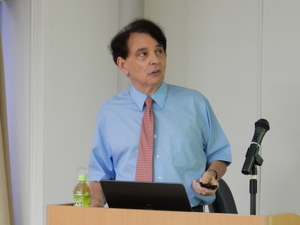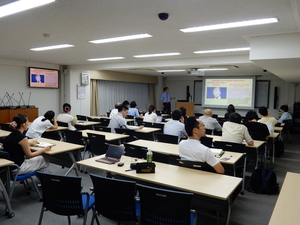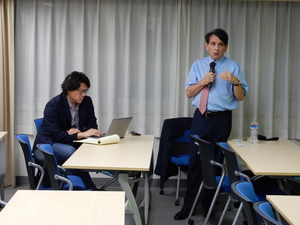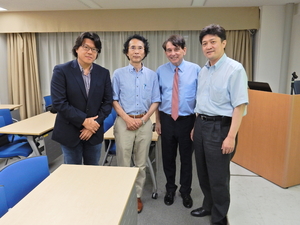Report
How does the United States handle an increasingly confident China under the leadership of Xi Jinping? Does the Trump administration’s first National Security Strategy that labels China as a “strategic competitor” set the tone for the U.S.-China relations in the near future? Is Taiwan a bargaining chip for the United States to gain leverage with China?
On July 4, the Institute for Advanced Studies on Asia and the Japan Association for Taiwan Studies co-hosted a discussion on the prospects for U.S.-Taiwan-China relations. The event featured a talk by Dr. William A. Stanton, Professor at the National Taiwan University and former Director of the American Institute in Taiwan (AIT), and was moderated by Professor Yasuhiro Matsuda at the University of Tokyo. Dr. Stanton began his talk by indicating a growing U.S. recognition — at the legislative, bureaucratic, and popular levels — of “incompatible” interests and values with China and an emerging consensus on a tougher China approach. While the United States has seemed to place less importance on maintaining a positive relationship with China, evidence has shown that its support for a democratic Taiwan has increased. Can Taiwan expect further U.S support? Dr. Stanton concluded by specifying variables that can influence the likelihood and effectiveness of increasing U.S. backing Taiwan, which include the U.S. president’s unpredictability and the existence of influential policy makers that favor an engagement policy toward China. Following the talk, Professor Matsuda pointed out the current mutual frustration between the United States and China and posed the question of whether future U.S.-China relations would continue on a downwards spiral or would swing like a pendulum between positive and negative extremes. The Q&A session was followed soon afterwards.
 |
 |
 |
 |
Information
Date and time: Wednesday, July 4, 2018 6:00 PM – 7:30 PM
Location: Main Conference Room, 3rd Floor, Institute for Advanced Studies on Asia
Speaker: William A. Stanton (Professor, International College, National Taiwan University; former Director of the American Institute in Taiwan)
* Moderator: Yasuhiro Matsuda (Professor, IASA, the University of Tokyo)
* Language: English (with Japanese and Chinese interpretation available during the Q&A session)
* Abstract:
As Xi Jinping has consolidated his power in China, he has also initiated increasingly aggressive policies abroad, including the One Belt-One Road plan, the militarization of the South China Sea, and ever greater pressure directed against Taiwan. In response, U.S. policy under President Trump toward both China and Taiwan has been erratic and contradictory. On the one hand, U.S. support for Taiwan, both political and bureaucratic, including concrete measures to bolster our relationship is unprecedented. On the other hand, Trump has often undermined this support in pursuit of an illusory “friendship” with Xi Jinping. As a result, if “push comes to shove,” it is by no means clear Taiwan can rely on the Unite States.
This event is supported by Japan Society for the Promotion of Science (JSPS) Grant-in-Aid for Scientific Research (A) under the research project, “Taiwan’s Growing Dependence on China and Growing Nationalistic Factors in the Cross-Strait Relations: Taiwan’s Political Economy in the Post-Ma Ying-jiu Era (対中依存構造化と中台のナショナリズム―ポスト馬英九期台湾の国際政治経済学),” chaired by Professor Yasuhiro Matsuda.
